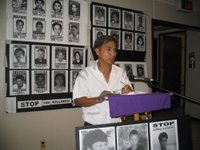Forum on Violence Against Movements, Movements Against Violence
Organized by the Institute for Popular Democracy and the University of the
Philippines College of Social Sciences Student Council
12 September 2006, 1-5 pm, UP Recto Hall
Presentation by Miriam Coronel Ferrer
Associate Professor, Department of Political Science, University of the
Philippines; Co-convener, Sulong CARHRIHL
For centuries, national security options of states straddled between two
approaches: one based on power, the other based on peace. The first
option, power, may be better said as “power over” or the principle of
domination over the groups posing a challenge to the state – its policies,
actions, and more fundamentally, its nature. “Power over,” at the minimum,
aims to neutralize, and at the maximum exterminate, eliminate, subjugate
contending forces in the name of the state and its desired attributes –
sovereignty, stability, survival. At a glance, this approach seems to be
the only logical option for a weak state, whose very weakness forces it to
make a show of being strong.
The second approach is peace – that is, to seek peace, peace as a
precondition to and/or an outcome of security. This approach is founded
on the core values of tolerance, pluralism, and dialogue, the exact
opposite of the values in the first approach: intolerance, inclusivity,
brute force and monologue. It involves state-building through much needed
reforms. Its guiding principle is “do no (more) harm” to the situation as
it is.
Collective impact measures
What we have been witnessing in the last years is an internal security
approach founded on the state’s attempt to dominate and subjugate critical
socio-political forces (first option). Its guiding principle is precisely
to “do harm”.
It incorporates the usual military operations against communist guerillas
operating in the countryside. Such an approach relies heavily on the
Philippine army whose marching orders are to clear, hold and consolidate
(the latter now entailing the participation of state welfare agencies in
what effectively is a lopsided application of a “comprehensive approach”).
Reports of de facto curfews, arbitrary searches, harassment, imposition of
the cedula, mopping up operations, notably in Nueva Ecija, but also
elsewhere reflect that the classic counter-insurgency approach of draining
the fish of its water continues. To suffocate the fish, the water is
contained, drained or rendered unable to resist military pressure.
These methods have been referred to as “collective impact measures.” As we
have seen, this type of measures intends to hurt the populace in order to
render them submissive, not really to finish them off. A local resident
who gets killed in the process is, well, seen as collateral damage to the
intent.
Collective impact measures also function as “collective punishment”.
Residents are scolded, chided, threatened for acts deemed sympathetic to
the enemy. Read the accounts of the general assemblies recently held in
Central Luzon by the military under General Jovito Palparan. Residents are
beseeched and courted, entertained with songs and sexy dancers in exchange
for their sympathies. They are urged to speak out despite the asymmetry in
the situation: unarmed, poor farmers facing fully armed lieutenants,
colonels and generals. And when they do speak out, and complain of abuses
of government soldiers, they are reprimanded, accused of already being
“influenced” if not themselves NPAs. They become the brunt of displaced
aggression, the easy target of traumatized soldiers faced with elusive
“enemies.”
The unprecedented high number of killings of political activists
associated with national democratic organizations (as well as other
left-wing groups such as the KPD) in compressed time is part of this
“collective punishment” frame. The extrajudicial killings we have seen
share the same features of rural community-based counter-guerilla warfare:
indiscriminate or dismissive of the distinction between combatants and
non-combatants, and clouded by “hate language” and demonization of the
enemy. A slight difference is that the killings are somewhat disguised,
they are not done by men in military uniform, and are individual or tandem
acts, whereas the usual counter-insurgency is marked by troops descending
in communities (although their name plates may be covered, and their truck
plates missing) who seek security and cover in numbers.
The killings’ desired impact is the same: fear, paralysis, scuttling of
the organizational network, albeit not just in the local but the national
sense. The goal is to break the political infrastructure of the movement
whose good showing in the past election (under the party list system) and
corresponding access to pork barrel funds and a public platform, were,
from the point of view of the anti-communist state, alarming. National
politics is after all the bigger pond where the fish swim. But here the
instructions are straight to the point: kill the fish.
In this power-based approach manifested in collective punitive measures,
victory is easy to measure. One is through body count: how many dead and
wounded? Another is through weapons count: how many weapons seized? And
finally, how many communities, organizations, people neutralized? (We can
discuss later how the same tendency is shown by the armed left.)
As we should all know by now, collective impact measures create more
problems due to the social tensions and resentment they generate in the
communities, and the affected public. They erode the fabric of society,
confuse its norms, polarize, and desensitize. They provide fodder to
counter-violence, and diminish faith in the system and peaceful change.
They are sure-fire formulas for greater violence. They are our own
“low-tech” version of weapons of mass destruction which nonetheless leads
to the same MAD-ness, or “mutually assured destruction.” The victory they
lay claim too is short-term, flaky, and one-sided.
Multi-Layered Contexts
Let us not lose sight of the multi-layered contexts of this intensified
state violence against a certain social force, its various apparatuses,
but ultimately, violence or assault on the citizen at large.
One context is the short term: GMA’s political survival. I will not
belabor this point since it is already fairly well-established and
well-reasoned out.
The long and short of this context is the legitimacy question raised
against the GMA administration. Here the national democratic left has
played a major role, whether in the attempts at setting off an impeachment
process (through its party list members in Congress pushing for it, not
once, but twice), or in military coup-cum-street protests that will force
GMA to step down (through its waltzing with the malcontents in the
military, in a queasy utilitarian alliance between the left and the
right). The natdem left has also put blocks (lodging cases in the Supreme
Court, protest rallies) to moves to strengthen emergency powers or
insulate the presidency from the checks powers in the hands of Congress
and the citizens.
It is to the GMA presidency’s interest to weaken the multiple machineries
of the national democratic left through both judicial (arrest warrants,
and actual arrests, e.g., of Crispin Beltran) and extra-judicial means, as
well as of all those lined up against her (why stop at one when you can
cast a wider net?). At the same time, it is to GMA’s interest to feed the
loyalty of key state players crucial to her political survival, notably,
the military (give them their war, medals, promotions, a free hand), the
police (give them their balato), the members of Congress (give them their
pork). It is in her interest to join the “coalition of the willing” and
the US-led global fight against terrorism in order to get the backing and
material support of US President Bush. In this regard, the GMA
administration actively lobbied for the inclusion of the CPP-NPA in the
list of terrorist organizations of the US and European bodies – even
though the CPP-NPA does not as a rule employ terrorist methods like
bombings.
But beyond the GMA presidency is the state of affairs of the Philippine
state – the more important, larger context. This is a question that will
transcend GMA (even if she stays up to 2010), and is related to but
distorted by the partisan peddling of charter change. I am referring to
the specter of not just a weak state but a disintegrating, failing state,
one where governance (led by whomever) increasingly becomes unstable and
short-sighted, and reforms impossible. The prospects of a failed state
result from the features of the post-Marcos state that we have inherited,
worse off in its fracturedness and the frankensteins that were born out of
the Marcos period, -- and how our political elites have selfishly played
their games in this situation. It is the bigger context where the wanton
use of state violence by both civilian and political leaders, and the
military’s privileged role in national security and national politics have
become even more ominous.
What is a failed state? Rotberg describes it as one marked by enduring
violence, though not necessarily always of high level of intensity. It is
tense, deeply conflicted, dangerous and contested bitterly by warring
factions, with varieties of civil unrest and two or more insurgencies,
different degrees of communal discontent and other forms of dissent
directed against it and at groups within it. Parts of the territory,
notably the peripheral regions, are not under its control. There is high
level of physical insecurity among citizens, thus they are armed or they
join rebel groups. The society endures a high level of criminal violence,
and delivery of socio-economic goods is limited. Its institutions are
flawed; its infrastructure, deteriorating or destroyed.
The more recent line from Palparan, said over one ANC program last week,
is almost a tacit recognition of our situation as a failing state. Because
only in such a state can his explanation for the killings make sense.
According to Palparan, the killings are perpetuated by people taking
vengeance on the NPA for the latter’s abuses. Queried if these people
include soldiers, he replied in the positive, saying such soldiers are
probably taking revenge for the death of other soldiers. If the state
were a viable state, the military with a chain of command, the President
the chief executive and implementer of the laws of the land – can this
kind of anarchy, can this lame excuse be palpable?
Anti-communism and anti-terrorism
The ideological foundation of and justification for the state’s excessive
use of violence remains, oddly anachronistic enough, anti-communism. The
language of anti-terrorism adds a new more contemporary twist, and locates
our domestic wars in the context of the post-9/11 world order.
The language of anti-communism remains effective, given a general
antipathy to communism, and an increasing alienation of the citizenry to
national politics. To those who have fallen for this anti-communist
“rhetorical hysteria” (defined by Wole Soyinka, first African to win the
Nobel prize for literature, as the one-dimensional approach to all faces
of reality, however varied or internally contradictory) , the killings are
not a case of “slaughter of innocents” given that these people are somehow
allied with the CPP-NPA. They don’t think much about the fact that
slaughter remains slaughter; that the basic principle of respect for human
life and human dignity is for everyone, including the enemy number one of
the state, and yes, including terrorists; that there are rules even in war
that must be followed, notably distinction between those who carry arms
and those who do not. Meanwhile, businessmen and professionals may be
morally aghast at the unabated killings of alleged communists, but are not
motivated enough to put pressure to stop it, until somehow, it starts
hurting their economic interests, or their immediate environment. The
middle class will continue to fight for their own means of survival
regardless of the course of Philippine politics.
However, class analysis alone cannot explain part of the lingering potency
of anti-communism. Part of the effectiveness of the language of
anti-communism and resultant alienation is also due to the CPP-NPA-NDF
themselves – their excesses (revolutionary taxation of rich and poor,
infliction of punishments) , own pandering of violence and machismo, their
inclusivity and dogmatic framing of Philippine society and politics, and
their counter-monologue to the state’s anti-communist mantra. The purges,
the CPP-NPA-NDF hopefully recognizes by now, cannot be simply forgotten
without full retribution and honest accounting before former and present
comrades and the greater public. The ghosts of murdered comrades will
haunt the party forever. And though not particularly convincing to explain
away the recent spate of political killings among those who study their
politics, and revolting for the disrespect shown the dead lying in mass
graves, the purges of the 80s and 90s will remain scraps (war material) to
poke around with, in the AFP and police forces’ psywar ops.
In all, taken in the context of an untransformed state and
reform-resistant state elites, the language of anti-communism coupled with
anti-terrorism is actually anti-left (because the communists do not alone
make up the Philippine left), and even more broadly, anti anti-status
quo. Thus while we have our differences with the communist left, and as
human rights advocates, oppose terrorist methods, we cannot tolerate the
rhetorical hysteria of anti-communism/ terrorism. We cannot be unconcerned
with the killings of branded communists/terroris ts, because the label
easily includes all of us unhappy with the status quo, and exercising our
rights to express our beliefs.
Ways Out
I have long been asking myself this rhetorical but really incisive
question: what is the central political question of today? During the
martial law regime and even during EDSA 2, the answer seemed simple
enough: Marcos, in the case of the former, and Erap, in the case of the
latter. Today, fortunately and unfortunately, we have to find the answers
beyond Garci, Gloria and the two Gonzaleses in government.
The political killings is a problem with GMA – her leadership, her policy
preferences, her questionable legitimacy based on her ascent to power
(EDSA 2 and dubious elections) – but is also a problem that transcends
her. Thus, removing GMA can be one short-term solution, but is not enough
for the long haul. And neither is the long-haul solution contingent on
removing her.
We must resolve how to deal with armed challenges faced by the state:
resolution through conquest of power by a dominant force using force, or
through sustainable, inclusive peace through peaceful means. The state has
been pursuing the former, it’s time to put more stake in the latter. But
it will only do this if we achieve critical mass in forcing the state to
take this direction.
We must work for a sustainable change founded on human rights and dignity
– or a peace process alongside pursuit of specific reforms. There are key
critical areas where state reforms are needed and where we should spread
out and simultaneously intervene: reform of our electoral institutions and
processes; reform of the security sector (cleansing and
professionalization of the military and police); enhancing governance
processes (depoliticization and upgrading of the bureaucracy) ,
strengthening of local governments leading to greater autonomy; and
putting more resources in the educational system so that education is
provided for all, and it is the kind of education where the values of
human rights and peace are at the core.
Correspondingly, we cannot accept counter-violence as the better nor best
way to fight state violence.
Our society is festering in a culture of violence -- violence that begets
violence, that dehumanizes the victims and the perpetuators, reduces all
fora to monologues, and elevates killing to the status of a national
sport. We find in our midst self-righteous protagonists out to lay claim
to their rights while blinded by their dogma and politics to the rights of
others. There is much to untangle in the orthodoxy of class antagonism, of
class struggle being necessarily violent, the state being the instrument
of the ruling class, and the primacy of armed struggle in achieving
political change. There is much to question about the soundness of the
Maoist injunction to encircle the cities from the countryside as the route
to revolutionary victory, the national democratic revolution as a stepping
stone to a socialist revolution, etc. Certainly, we should discuss these,
debate and challenge (but not kill) each other.
Let us have a national debate not to divide us further but in order for us
-- state actors, counter-state forces, and ordinary citizens -- to reach
some national consensus on how to best achieve social and political
change. Without a shared norm or ground rules, and a consensual road map
to start as off, we are doomed as a nation.
To conclude, the campaign against political killings of leftwing activists
requires focused, case-specific response directed against the perpetrators
and their chain of command. It also compels us to ask hard questions about
the national security orientation and national security policies of the
state and concerned agencies.
But our advocacy should be extended to become a campaign for a peace
process; a movement against political violence as a whole, promoting human
rights and extracting accountability from all parties (such as what Sulong
CARHRIHL aims to do, using the CARHRIHL as framework); a dialogue for
norms founded on life-affirming means and ends; a national quest for peace
built on respect for human rights.
Human rights, peace, students, development and other groups should come
together to work for new politics, the kind of politics that makes a firm
stand against political violence.
References:
Buzan, Barry. 1983. People States & Fear, The National Security Problem in
International Relations. Hertfordshire: Harvester Wheatsheaf.
Rotberg, Robert . 2004. When States Fail, Causes and Consequence.
Princeton, New Jersey: Princeton University Press.
Soyinka, Wole. 2004. Climate of Fear. London: Profile Books Ltd.
Stepanova, Ektarina. 2003. Anti-terrorism and Peace-building During and
After Conflict. Stockholm: Stockholm International Peace Research
Institute.






